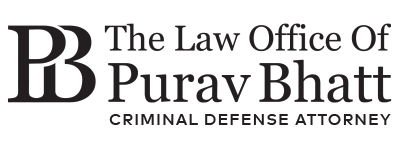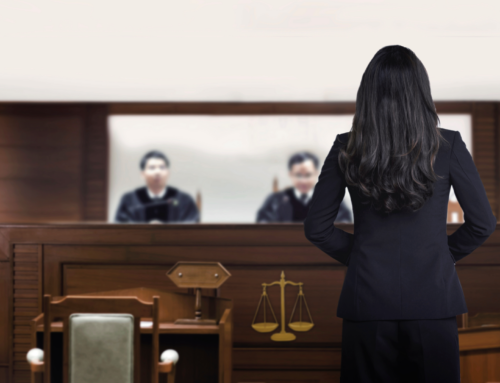Innocent until proven guilty is the foundation of the Illinois criminal justice system. Yet, the reality is that individuals facing criminal charges often find themselves pitted against the formidable state machinery. From the moment you become entangled in the criminal justice system – whether through arrest, investigation, or formal charges – you have to face the state machinery at every step, which can be extremely challenging. In the face of such formidable opposition, legal representation is necessary.
At The Law Office of Purav Bhatt, we are committed to protecting the constitutional rights of individuals and upholding the principles of justice. Armed with a deep understanding of criminal law, procedural rules, and courtroom strategies, our Chicago criminal defense lawyers will stand with you at every step of the legal process, craft effective defense strategies, and fight tirelessly to protect your rights, reputation, and freedom.
Talk to our skilled criminal defense attorney who has extensive experience practicing criminal law. Give us a call at 773-791-9682 to schedule a consultation with us today.
👉Also Read: How A Chicago Criminal Defense Lawyer Champions Fair Trial Rights Amidst Rising Legal Challenges
Criminal Charges in Chicago, IL
In Chicago, criminal charges can broadly be categorized into violent, non-violent, and sexual offenses.
Violent Criminal Charges
Violent offenses involve the use of force or threat of force against another person – resulting in harm, injury, or the risk of harm. Common violent criminal charges in Chicago include:
- Assault and Battery: Intentionally causing bodily harm or offensive contact to another person.
- Homicide: Unlawfully causing the death of another person, which may be classified as murder, manslaughter, or negligent homicide.
- Robbery: Taking property from another person by force, threat of force, or intimidation.
- Aggravated Assault: Assault involving a deadly weapon or resulting in serious bodily injury.
- Domestic Violence: Acts of violence or abuse committed against family or household members.
- Kidnapping: Unlawfully seizing, confining, or transporting another person against their will.
Non-Violent Criminal Charges
Non-violent offenses do not involve physical harm to another person but can cause financial loss, property damage, or other forms of harm. Common non-violent criminal charges in Chicago include:
- Theft and Property Crimes: Taking or unlawfully obtaining another person’s property, including burglary, shoplifting, theft, and robbery.
- Drug Offenses: Possession, distribution, trafficking, or manufacturing of illegal drugs or controlled substances.
- White-Collar Crimes: Financial crimes like fraud, embezzlement, money laundering, and identity theft.
- Property Damage: Willfully damaging or destroying another person’s property, including vandalism and arson.
- Traffic Violations: Violations of traffic laws like driving under the influence (DUI), reckless driving, or driving without a valid license.
Sexual Criminal Charges
Sexual offenses involve non-consensual sexual contact or behavior and are often prosecuted aggressively due to their serious nature. Common sexual criminal charges in Chicago include:
- Sexual Assault: Non-consensual sexual contact or intercourse, also known as rape or sexual battery.
- Child Sexual Abuse: Sexual exploitation, molestation, or abuse of minors.
- Sexual Exploitation: Production, distribution, or possession of child pornography or other sexually explicit materials involving minors.
- Sexual Harassment: Unwanted sexual advances, requests for sexual favors, or other verbal or physical conduct of a sexual nature in the workplace or other settings.
- Prostitution and Solicitation: Engaging in or soliciting sexual acts in exchange for money or other goods or services.
👉Also Read: Don’t Let a Criminal Conviction Define You: Seek Help From Chicago’s Top Defense Attorneys
Steps Involved in the Legal Process in Chicago
In Chicago, the legal process for a criminal case typically includes several steps – from arrest to trial. While the specifics can vary depending on the nature of the charges, here is a general overview.
- Arrest: The legal process typically begins with your arrest by law enforcement officers. After the arrest, you will be taken into police custody. Your priority at this stage should be to speak to an experienced criminal defense lawyer as soon as possible to protect your rights.
- Booking and Initial Appearance: After being arrested, you will be taken to a police station for booking. During booking, your personal information will be recorded, fingerprints will be taken, and you will be photographed. Following booking, you will have an initial appearance before a judge, where you will be informed of the charges against you and advised of your rights.
- Bail or Bond Hearing: Depending on the circumstances of the case, the judge might set bail or bond at the initial appearance. Bail is a monetary amount that you must pay to be released from custody pending trial. If you cannot afford bail, you can seek a bond through a bail bondsman or request a reduction in bail from the judge.
- Preliminary Hearing or Grand Jury Indictment: In felony cases, the prosecution might present evidence at a preliminary hearing to establish probable cause that you committed a crime. Alternatively, the prosecution might present the case to a grand jury, which will decide whether to indict you based on the evidence presented.
- Arraignment: At the arraignment, you need to formally enter a plea of guilty, not guilty, or no contest to the charges. If you plead not guilty, the case will proceed to trial. If you plead guilty or no contest, the case will proceed to sentencing.
- Discovery and Pretrial Motions: During the pretrial phase, both the prosecution and defense exchange information and evidence through a process known as discovery. Your criminal defense attorney might also file pretrial motions – including motions to suppress evidence or dismiss charges – which the court will consider before trial.
- Trial: If the case goes to trial, the prosecution will present its evidence and witnesses, followed by the defense. Both sides will have the opportunity to cross-examine witnesses and present arguments to the judge or jury. After hearing all the evidence, the judge or jury will deliberate and reach a verdict of guilty or not guilty.
- Sentencing: If you are found guilty or if you plead guilty, the case will proceed to sentencing. The judge will impose a sentence, which might include fines, probation, community service, restitution, or incarceration, depending on the severity of the offense and other factors.
- Appeals: Following a conviction, you have the right to appeal the verdict or sentence. Appeals are typically based on legal errors that occurred during the trial or sentencing phase of the case.
Differences between State Charges and Federal Criminal Charges
An experienced criminal defense attorney will know the key differences between state-level criminal charges and federal charges. These include:
Jurisdiction
State criminal charges are prosecuted under state laws and within the state court system, while federal charges are prosecuted under federal laws and within the federal court system. State laws typically govern offenses that occur within the state’s boundaries and involve violations of state statutes like murder, robbery, assault, and drug possession.
Federal laws, on the other hand, apply to offenses that involve violations of federal statutes, occur on federal property, or have a significant interstate or international impact like drug trafficking, immigration violations, bank robbery, and mail fraud.
Investigative Agencies
State-level criminal investigations are conducted by state and local law enforcement agencies like city police departments, county sheriffs’ offices, and state bureaus of investigation.
Federal criminal investigations, on the other hand, are conducted by federal law enforcement agencies like the Federal Bureau of Investigation (FBI), Drug Enforcement Administration (DEA), Bureau of Alcohol, Tobacco, Firearms and Explosives (ATF), and others. Federal agencies often have jurisdiction over crimes that involve federal interests, cross state lines, or have an interstate or international impact.
Prosecution and Sentencing
State-level criminal cases are prosecuted by state or local prosecutors and adjudicated in state courts, which may include trial courts, appellate courts, and state supreme courts. Sentencing in state court cases is typically governed by state sentencing guidelines and statutes.
Federal criminal cases are prosecuted by Assistant United States Attorneys (AUSAs) and adjudicated in federal district courts, which have jurisdiction over offenses that violate federal laws. Sentencing in federal court cases is governed by the United States Sentencing Guidelines, which provide a framework for judges to determine sentences based on factors like the severity of the offense, the defendant’s criminal history, and other relevant considerations.
Why Choose Our Criminal Defense Lawyers to Defend Yourself Against Federal Charges
At The Law Office of Purav Bhatt, we have the skills, experience and resources to put up a robust defense for you against state as well as federal criminal offenses. Here’s why you should choose our law offices when facing federal charges:
Federal Law Expertise: We have in-depth knowledge of federal criminal law, statutes, rules, and procedures. We are well-versed in the nuances of federal statutes and case law. This expertise allows us to develop sophisticated defense strategies tailored to the specific legal issues and challenges presented in federal cases.
Federal Court Experience: We have extensive experience practicing in federal courts including federal district courts and appellate courts. We are familiar with federal rules of evidence, courtroom procedures, and legal arguments unique to federal law.
Federal Investigations Knowledge: We know how federal investigations are conducted and have experience dealing with federal law enforcement agencies like the FBI, DEA, ATF, and others. We know how to challenge evidence obtained through unlawful or unconstitutional means and how to identify weaknesses in the government’s case. We also have experience negotiating with federal prosecutors we know how to leverage our connections to achieve favorable outcomes for our clients.
Sentencing Guidelines Proficiency: We are well-versed in federal sentencing guidelines and understand how they apply to various federal offenses. We have the skills to effectively advocate for reduced sentences, alternative sentencing options, or other favorable resolutions during the sentencing phase of federal cases.
Trial and Litigation Skills: We have extensive litigation experience and have a proven track record of success in federal criminal trials. We have the litigation skills necessary to present a strong defense at trial and achieve favorable verdicts for our clients.
Difference between Standard Criminal Defense and Affirmative Defense
The difference between a standard criminal defense and an affirmative defense lies in the nature of the argument and the burden of proof:
Standard Criminal Defense
In a standard criminal defense, you challenge the prosecution’s case by disputing one or more elements of the crime you are charged with.
For example, you can argue that there is insufficient evidence to prove your guilt beyond a reasonable doubt, the prosecution failed to meet its burden of proof, or that there are legal defenses or mitigating circumstances that justify acquittal or reduced charges. Standard defenses typically involve attacking the credibility of witnesses, challenging the admissibility of evidence, or raising legal arguments based on statutory or constitutional grounds.
Affirmative Defense
In an affirmative defense, you admit to committing the offense you are accused of, but make the argument that your actions or conduct was justified due to certain mitigating circumstances.
Unlike a standard defense, which requires the prosecution to prove your guilt beyond a reasonable doubt, an affirmative defense places the burden of proof on you. You are required to prove by a preponderance of the evidence that you had a valid reason to do what you did. Common affirmative defenses include self-defense, duress, necessity, entrapment, and consent.
Potential Defense Strategies Our Chicago, IL Criminal Defense Attorneys Can Use to Defend You
Alibi: An alibi defense asserts that you were elsewhere at the time the alleged crime was committed and therefore could not have been responsible for it. Witness testimony, surveillance footage, or other kinds of documentary evidence can be presented to corroborate your claim of being in a different location.
Self-Defense: Self-defense is a legal defense that allows you to use reasonable and justifiable force to protect yourself from imminent harm or danger. It can be invoked if you reasonably believed force was necessary to prevent injury or death and if you used no more force than reasonably necessary to defend yourself.
Defense of Others: Similar to self-defense, the defense of others is a legal defense that allows you to use reasonable force to protect another person from imminent harm or danger. It can be invoked if you reasonably believed that the other person was in immediate danger of harm and used reasonable force to defend them.
Involuntary Intoxication: Involuntary intoxication occurs when you are involuntarily intoxicated (like being drugged without your knowledge) and you commit a crime as a result. We can argue that your intoxication prevented you from forming the necessary intent to commit the crime and therefore should not be held criminally responsible.
Mistake of Fact: Mistake of fact is a defense that asserts that you made an honest and reasonable mistake about a fact relevant to the alleged crime, which negates the requisite intent or mental state for criminal liability. The mistake must be genuine, reasonable, and directly related to the alleged offense.
Duress: Duress is a defense that asserts that you committed the alleged crime under threat or coercion by another person. It can be invoked if you reasonably believed that you faced imminent harm or danger, had no reasonable opportunity to escape the threat, and believed that committing the crime in question was the only way to avoid the harm.
Consent: Consent is a defense that asserts the alleged victim willingly and knowingly agreed to the conduct in question, thereby negating any claim of criminal liability. The defense can be raised in cases involving certain sexual offenses, assault, or other crimes where consent is a relevant factor.
Entrapment: Entrapment occurs when law enforcement induces or encourages you to commit a crime you would not have otherwise committed, thereby creating a defense against criminal liability.
Constitutional violations: Constitutional violations refer to breaches of your constitutional rights. These might include illegal searches and seizures, coerced confessions, or denial of the right to counsel. We can make the argument that evidence obtained in violation of your constitutional rights should be excluded from trial.
Lack of probable cause: Lack of probable cause is a defense that challenges the legality of the arrest or search leading to the discovery of evidence. We can make the argument that law enforcement lacked sufficient justification or reasonable grounds to believe you had committed a crime or were involved in criminal activity, rendering the arrest or search unlawful and any evidence obtained as a result inadmissible.
👉Also Read: Defending Your Rights: Criminal Defense Attorneys Tackle Retail Theft Cases in Chicago
Factors Our Chicago, IL Criminal Defense Attorneys Will Consider While Developing Defense Strategies
Nature of the Charges
The allegations and charges against you play a significant role in shaping the defense strategies we will use. Based on the nature and severity of the charges – whether they involve violent crimes, drug offenses, white-collar crimes, or other types of offenses – we will decide what kind of legal arguments, evidentiary challenges, and defense tactics should be employed.
Investigation and Discovery
Conducting a thorough investigation and discovery is essential for uncovering evidence, identifying witnesses, and building a strong defense. This might involve interviewing witnesses, obtaining surveillance footage, analyzing forensic evidence, reviewing police reports and documents, and hiring experts if necessary.
Strength of the Evidence
Assessing the strength of the prosecution’s evidence is important in determining the viability of various defense strategies. We will evaluate the quality and admissibility of the evidence and decide what kind of defense can be invoked.
Your Version of Events
Understanding your version of events and your perspective on the case is essential for building an effective defense. We will listen to your account of what happened, look for potential discrepancies or inconsistencies, and work to corroborate your story with supporting evidence or witnesses.
Negotiation and Plea Bargaining
The potential for negotiation and plea bargaining with the prosecution is another key factor we will take into account while crafting a defense strategy. We will evaluate the strengths and weaknesses of the case, your objectives and priorities, and the potential benefits and risks of accepting a plea deal versus going to trial.
Your Background and Circumstances
We believe that understanding your background, personal history, and circumstances is important for providing holistic representation. We will consider a wide range of mitigating factors that can impact your case – including your socioeconomic status, whether you have any mental health issues, whether you have a substance abuse problem, whether you have a criminal record and many more.
Chicago Criminal Lawyer Purav Bhatt is Best-Equipped to Represent You
Being a former prosecutor, Purav Bhatt is uniquely positioned to provide you with highly effective, result-oriented legal representation. There are many reasons why Purav Bhatt’s prosecutorial background can work to your advantage and increase the chances of a favorable outcome. These include:
Insider Knowledge and Insights
Attorney Purav Bhatt has firsthand experience working within the criminal justice system. He knows how cases are investigated, charged, and prosecuted. It allows him to anticipate the prosecution’s strategies and moves and effectively counter their arguments.
Understanding of Prosecutorial Perspectives
Having served as a prosecutor himself, Purav Bhatt has a unique understanding of the mindset and motivations of the prosecution. He can leverage this insight to negotiate effectively with prosecutors, identify weaknesses in the prosecution’s case, and develop strong defense strategies tailored to the specific circumstances of your case.
Established Relationships and Credibility
Over the years, Purav Bhatt has established strong relationships with prosecutors, law enforcement officials, judges, and other people within the legal community. These relationships can be valuable in advocating for your interests, negotiating favorable plea deals, and arguing for lenient sentences.
Strategic Defense Approach
With his insider knowledge and experience, Purav Bhatt is adept at developing strategic defense approaches tailored to the nuances of each case. He can identify evidentiary issues, procedural mistakes, and other errors that might be overlooked by other defense attorneys and attack the prosecution’s case at its weakest point. It can maximize the chances of a successful outcome in your case.
👉Also Read: Championing Justice: Chicago Attorneys Defend Against Drug Trafficking Charges
Get a Seasoned Chicago Criminal Attorney on Your Side Today
If you are being investigated for a crime or have been charged with a misdemeanor or felony, it is extremely important to get legal representation as fast as you can. At The Law Office of Purav Bhatt, we understand the urgency of your situation and know what is at stake for you. We can spring into action immediately, conduct a thorough investigation into your case, analyze evidence, and develop an effective defense strategy to achieve the best possible outcome for you.
Our legal team is led by our founder – Purav Bhatt – who is a former prosecutor and has firsthand knowledge of how the legal system works in Chicago. For more than a decade, Purav Bhatt has used his prosecutorial knowledge to successfully defend people facing a wide range of criminal charges – from DUI to drug offenses, firearm offenses, sexual offenses, and more.
The sooner you reach out to us, the sooner we can start building a robust defense for you. Call our criminal defense law firm today at 773-791-9682 or fill out our online contact form to schedule a confidential consultation with a top-rated Chicago criminal defense lawyer.






